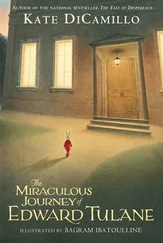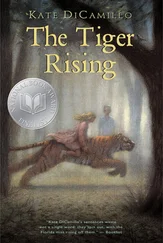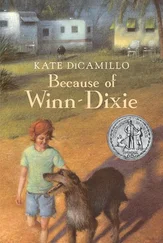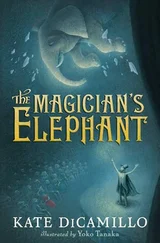“To the castle!” shouted the soldier. “I’ll take you to the castle.”
“The castle? Where the itty-bitty princess lives?”
“That’s right.”
“Gor,” said Mig, “I aim to be a princess, too, someday.”
“That’s a fine dream,” said the soldier. He clucked to the horse and tapped the reins and they took off.
“I’m happy to be going,” said Mig, putting a hand up and gently touching one of her cauliflower ears.
“Might just as well be happy, seeing as it doesn’t make a difference to anyone but you if you are or not,” said the soldier. “We will take you to the castle and they will set you up fine. You no longer will be a slave. You will be a paid servant.”
“Eh?” said Mig.
“You will be a servant!” shouted the soldier. “Not a slave!”
“Gor!” said Mig, satisfied. “A servant I will be, not a slave.”
She was twelve years old. Her mother was dead. Her father had sold her. Her Uncle, who wasn’t her uncle at all, had clouted her until she was almost deaf. And she wanted, more than anything in the world, to be a little princess wearing a golden crown and riding a high-stepping white horse.
Reader, do you think that it is a terrible thing to hope when there is really no reason to hope at all? Or is it (as the soldier said about happiness) something that you might just as well do, since, in the end, it really makes no difference to anyone but you?

MIGGERY SOW’S LUCK CONTINUED. On her first day on the job as a castle servant, she was sent to deliver a spool of red thread to the princess.
“Mind,” said the head of the serving staff, a dour woman named Louise, “she is royalty, so you must make sure you curtsy.”
“How’s that?” shouted Mig.
“You must curtsy!” shouted Louise.
“Gor,” said Mig, “yes’m.”
She took the spool of thread from Louise and made her way up the golden stairs to the princess’s room, talking to herself as she went.
“Here I am, off to see the princess. Me, Miggery Sow, seeing the princess up close and personal-like. And first off, I must cursy because she is the royalty.”
At the door to the princess’s room, Mig had a sudden crisis of confidence. She stood a moment, clutching the spool of thread and muttering to herself.
“Now, how did that go?” she said. “Give the princess the thread and then give her a cursy? No, no, first the cursy and then the thread. That’s it. Gor, that’s right, that’s the order. Start with the cursy and finish with the thread.”
She knocked at the princess’s door.
“Enter,” said the Pea.
Mig, hearing nothing, knocked again.
“Enter,” said the Pea.
And Mig, still hearing nothing, knocked yet again. “Maybe,” she said to herself, “the princess ain’t to home.”
But then the door was flung wide and there was the princess herself, staring right at Miggery Sow.
“Gor,” said Mig, her mouth hanging open.
“Hello,” said the Pea. “Are you the new serving maid? Have you brought me my thread?”
“Cursy I must!” shouted Mig.
She gathered her skirts, dropped the spool of thread, stuck a foot out, and stepped on the spool, rocked back and forth for what seemed like quite a long time (both to the watching princess and the rocking Mig), and finally fell to the floor with a Miggish thud.
“Whoopsie,” said Miggery Sow.
The Pea could not help it — she laughed. “That’s all right,” she said to Mig, shaking her head. “It’s the spirit of the thing that counts.”
“How’s that?” shouted Mig.
“It’s the spirit of the thing that counts!” shouted Pea.
“Thank you, miss,” said Mig. She got slowly to her feet. She looked at the princess. She looked down at the floor. “First the cursy and then the thread,” Mig muttered.
“Pardon?” said the Pea.
“Gor!” said Mig. “The thread!” She dropped to her hands and knees to locate the spool of thread; when she found it, she stood back up and offered it to Pea. “I brought you yer thread, didn’t I?”
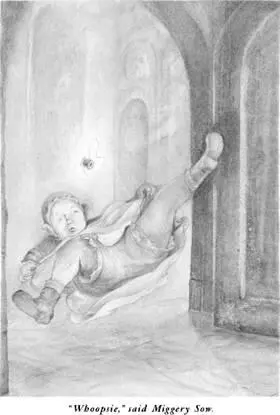
“Lovely,” said the princess as she took the thread from Mig. “Thank you so much. I cannot seem to hold on to a spool of red thread. Every one I have disappears somehow.”
“Are you making a thing?” asked Mig, squinting at the cloth in the Pea’s hand.
“I am making a history of the world, my world,” said the Pea, “in tapestry. See? Here is my father, the king. And he is playing the guitar because that is something he loves to do and does quite well. And here is my mother, the queen, and she is eating soup because she loved soup.”
“Soup! Gor! That’s against the law.”
“Yes,” said the princess, “my father outlawed it because my mother died while she was eating it.”
“Your ma’s dead?”
“Yes,” said the Pea. “She died just last month.” She bit her bottom lip to stop it from trembling.
“Ain’t that the thing?” said Mig. “My ma is dead, too.”
“How old were you when she died?”
“Bold was I?” said Mig, taking a step back, away from the princess. “I’m sorry, then.”
“No, no, how old . How old were you?” shouted the Pea.
“Not but six,” said Mig.
“I’m sorry,” said the princess. She gave Mig a quick, deep look of sympathy. “How old are you now?”
“Twelve years.”
“So am I,” said the princess. “We’re the same age. What is your name?” she shouted.
“Miggery. Miggery Sow, but most just calls me Mig. And I saw you once before, Princess. You passed me by on a little white horse. On my birthday, it was, and I was in the field with Uncle’s sheep and it was sunset time.”
“Did I wave to you?” asked the princess.
“Eh?”
“Did I wave?” shouted the Pea.
“Yes,” nodded Mig.
“But you didn’t wave back,” said the princess.
“I did,” said Mig. “Only you didn’t see. Someday, I will sit on a little white horse and wear a crown and wave. Someday,” said Mig, and she put up a hand to touch her left ear, “I will be a princess, too.”
“Really?” said the Pea. And she gave Mig another quick, deep look, but said nothing else.
When Mig finally made her way back down the golden stairs, Louise was waiting for her.
“How long,” she roared, “did it take you to deliver a spool of thread to the princess?”
“Too long?” guessed Mig.
“That’s right,” said Louise. And she gave Mig a good clout to the ear. “You are not destined to be one of our star servants. That is already abundantly clear.”
“No, ma’am,” said Mig. “That’s all right, though, because I aim to be a princess.”
“You? A princess? Don’t make me laugh.”
This, reader, was a little joke on Louise’s part, as she was not a person who laughed. Ever. Not even at a notion as ridiculous as Miggery Sow becoming a princess.

AT THE CASTLE, for the first time in her young life, Mig had enough to eat. And eat she did. She quickly became plump and then plumper still. She grew rounder and rounder and bigger and bigger. Only her head stayed small.
Reader, as the teller of this tale, it is my duty from time to time to utter some hard and rather disagreeable truths. In the spirit of honesty, then, I must inform you that Mig was the tiniest bit lazy. And, too, she was not the sharpest knife in the drawer. That is, she was a bit slow-witted.
Читать дальше







